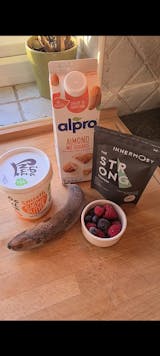Siberian Ginseng is one of the world’s best-known adaptogens. An adaptogen describes natural substances which are considered to increase the strength and wellness of the body (and we’re a huge fan of them, if you hadn’t noticed).
Often referred to by one of the plant's many, many names, Siberian Ginseng (or Devil's Bush, Ginseng Root or Wild Pepper, whatever you prefer), has been used for thousands of years as a herbal medicine technique to treat a range of medical issues and ailments.
Millions of people all around the world use Siberian Ginseng supplementations every single day for their range of benefits. Many also take the supplement as a natural alternative to caffeine due to the plant’s energy-boosting aspects. But what is it?
What is Siberian Ginseng?
Siberian Ginseng is a plant that looks pretty similar to that of a blackberry bush. The plants can get pretty big and grow anywhere between three to ten feet tall and are covered in thorns, as well as beautiful yellow and violet flowers. In the summer months, these flowers develop into round, black berries.
The root is often used in the creation of Siberian Ginseng supplements due to the eleutherosides that are found in them, and this is where all the health benefits come from. Eletherosides, or eleuthero, are chemical compounds that were first used in China as a herbal medicine.
Siberian Ginseng health benefits
The crazy health benefits of Siberian Ginseng are how the plant got its hugely popular rep. First used to treat the common cold and flu viruses, Siberian Ginseng has been researched extensively, uncovering a range of health benefits (some of which may surprise you!)
- Alleviates the symptoms of stress
Stress is one of the biggest root causes of other more serious health issues, such as cardiovascular issues and mental health problems. Siberian Ginseng supplements are a great way to naturally combat these and ensure you stay on top of your performance.
- Assists in the treatment of bipolar disorder
Siberian Ginseng has been noted for its assistance in the management of symptoms of bipolar disorder when taken consistently and for a prolonged period of time.
- Helps manage diabetes
As Siberian Ginseng has been noted to reduce blood sugar levels, this adaptogen could be useful in assisting sufferers of diabetes. Have a chat with your doctor and see if this could work for you.
- Alleviates insomnia
Whilst the supplement does increase your energy levels, it also helps with sleep issues, too. Good night sleep, here we come!
- Boosts your immune system
Those eleutherosides we were talking about are a key player in boosting your immune system, so Siberian Ginseng supplementations are a great way to do that.
- Improves your memory
Siberian Ginseng has been noted to improve memory and mental speed, especially when taken in collab with rhodiola (entering… The Focus Capsules)
- Reduces mental and physical fatigue
The energy-promoting benefits of Siberian Ginseng mean that supplementation will greatly reduce your fatigue levels. Can’t complain there.
That’s a lot of benefits. Cool, right?
Siberian Ginseng research
We’ve also found some pretty good research to back it up with cold hard facts.
In a randomised controlled trial of Siberian Ginseng, it was found that Siberian Ginseng supplementation in sufferers of chronic fatigue was really effective in reducing the patients' fatigue symptoms. In another research study that focused on the overall wellness and mental health of elderly patients, Siberian Ginseng was found to safely improve the wellbeing of the patients after four weeks of supplementation therapy. Research has also found that the adaptogen has performance enhancing benefits when it comes to exercise, too.
The benefits just keep on coming!
Siberian Ginseng supplements
Variations of Ginseng are commonly used in health supplements for the above benefits, and here at Innermost, we wanted to get on board with as much adaptogen goodness as possible. We were so impressed by the benefits of Siberian Ginseng, in fact, that we included the herbal supplement in our very own range of products.
The Focus Capsules contain 400mg of Siberian Ginseng in every single serving, well and truly setting you up for everything the day has in store. With added L-Tyrosine, Bacopa Monnieri, CDP-Choline and Rhodiola Rosea, The Focus Capsules have everything you need to up your focus and improve your performance.
As always, Innermost has got you covered.
References
- Cicero, A. F. G., Derosa, G., Brillante, R., Bernardi, R., Nascetti, S., & Gaddi, A. (2004). Effects of Siberian ginseng (Eleutherococcus senticosus maxim.) on elderly quality of life: a randomized clinical trial. Archives of Gerontology and Geriatrics, 38, 69-73. Click here.
- Rasmussen, C. B., Glisson, J. K., & Minor, D. S. (2012). Dietary supplements and hypertension: potential benefits and precautions. The Journal of Clinical Hypertension, 14(7), 467-471. Click here.























